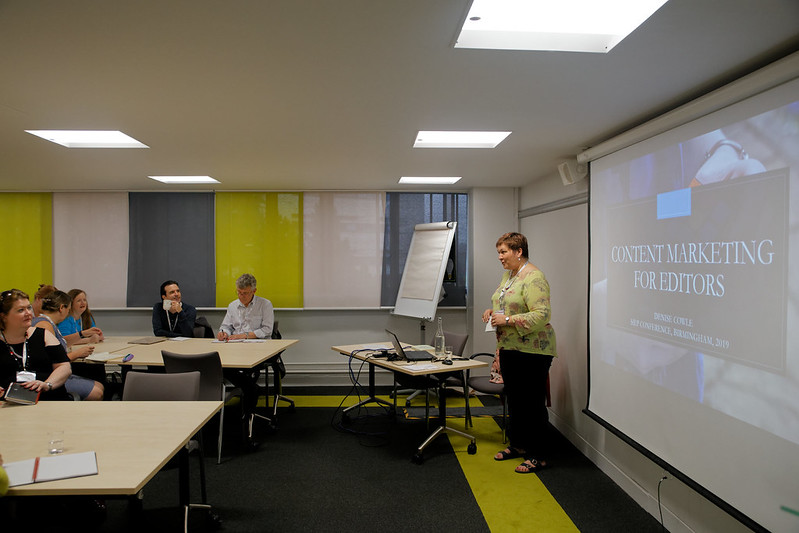Editing between British and US styles can be less straightforward than expected. Cathy Tingle explores a few of the trickier aspects of switching between the two.
‘Never assume: it makes an ass out of u and me’ is a phrase from salaried working life that rattles around my head as a freelance editor. In the early noughties it was my boss’s waggish response when one of the team said ‘I assume that …’. But it’s gained new significance with editing experience. Nothing is set in stone. It might even be different to how I’d always imagined.
US style: Firm ground or shifting sands?
US style is one example. It’s common for British editors to be asked to edit in US style, or into it. With the first, you’re on firmer ground. The overriding style is likely sound, most of the decisions already made for you. When you need to decide on something, you do it based on what else you’re aligning with, author preference and general convention. Easy.
But if you’re editing into US style it’s less easy, for two reasons that David Crystal outlines in ‘Regional variation’, chapter 20 of the Cambridge Encyclopedia of the English Language. First, with global communications and shared culture, the linguistic boundaries between US and British English are becoming blurred with loanwords and spelling variants. And, second, there was never one ‘US style’. As with British style, there have always been variations, including regional ones.
Why style matters
Readers are less awake than editors to the style of whatever they’re reading, although most will know which side of the Atlantic it comes from. What they can detect, however, is a lack of stylistic coherence. Inconsistency jars, and it can slowly but surely destroy the reader’s trust in the text, even if the reader isn’t sure why. There will just be a general sense of shoddiness, which could then find its sorry way into an unfavourable Amazon review.
Correspondingly, most editorial professionals will know the main differences between UK and US style: spelling, punctuation, the formatting of dates and times. But there are more nuanced differences. And you can’t assume there will always be a difference. You might think that dialog and catalog are the US version of dialogue and catalogue because you saw those spellings once in some US content, but in the US’s Merriam-Webster dictionary, dialogue is listed first as more common than dialog. And then it gets more complicated: Merriam-Webster lists catalog first. This means that The Chicago Manual of Style, as it ‘usually prefers the first-listed entries at Merriam-Webster.com’ (CMOS 7.1), uses dialogue and catalog too. So we can’t even rely on the easy assumption that if the end of one word behaves in one way, the end of a similar word will do the same thing.
Toward/s an answer
How about towards and toward? The answer seems straightforward: towards is UK style; toward is US, right? When someone asked about the difference on the CIEP online forums recently, that’s what I said, because it’s what I’d always … ah … assumed. I was soon corrected, with a link to a previous forum thread that cited a Merriam-Webster article. This article concluded: ‘If you’re an American, you can use either toward or towards, depending on what sounds more natural to you. There are those who will claim that towards in American English is wrong, but it’s really a matter of preference.’ So, not so straightforward.
There are certain spellings that are famously different in UK and US styles: colour/color, centre/center, travelling/traveling, mould/mold. But some US spellings we might miss when editing US text into British English, and some British spellings we might miss when translating into US style.
Nouns kerb (British) and curb (US) can cause problems. If you’re talking about restraining something, or reining it in, you should always use curb in both British and US styles. So we might not realise the noun curb is in US style because we see it as a verb in British English. And because in the UK we’re used to seeing the noun practice, people get confused about the spelling of the verb in British English, often mistakenly using a c.
Keep your eyes open
The key is awareness of all the tricky differences between UK and US styles. These also cover variations of vocabulary and different systems of measurement.
Would you notice truck rather than lorry in a piece? Or morgue rather than mortuary? The BBC, after mentioning these examples, singles out rooster in its news style guide: ‘we should not use the word “rooster” instead of “cockerel” for a story about a “cockerel” based in France’, but as rooster is used in British contexts – it’s the name of a UK banking service for children, for example – it’s easy to miss. Similarly, if you’re used to hearing about monster trucks from a young relative, it’s hard to remember that the UK version is lorry.
Measurements are important to get right – a mistake could ruin a recipe or, worse, overdose a patient – but in the UK and the USA the same or a similar word can represent a different quantity or weight. A UK pint is 20 fl oz. A US pint is 20% less liquid, at 16 fl oz. You might think: ‘Yes, and a billion in the UK is a US trillion.’ You’d have been right a few decades ago, but now US and British billions and trillions are aligned. Make sure you keep up to date, and know the exceptions, too: in some European countries, billions still mean the same thing as US (and now British) trillions.
Do your homework
All this matters. When converting British style to US style or US to British, or when editing in US style if you’re British, you need to understand all the possible variants. Start with a basic list from your favourite usage guide, then add to it. New Hart’s Rules contains a detailed account of the differences. Part 2 of the Economist Style Guide is about American and British English. The CIEP has a fact sheet on the differences. Keep Merriam-Webster open in your internet tabs. But dig deeper, too. Lynne Murphy’s The Prodigal Tongue will remind you that differences are rarely as straightforward as they seem.
Finally, when we assume, is the ‘ass’ it makes out of you and me ‘a fool’, ‘a donkey’ or – you know – a ‘rear end’, that common US slang definition now increasingly used in British English? That question alone should be enough to send you hunting for a second opinion from reference books, dictionaries and colleagues whenever you’re working between different Englishes.
Resources
BBC Style Guide. Americanisms. bbc.co.uk/newsstyleguide/all/#a
Chicago Manual of Style (2017). 17th edition. University of Chicago Press.
CIEP (2021). Common style differences between British and US English. Fact sheet. ciep.uk/resources/factsheets/#BUE
Crystal, David (2019). The Cambridge Encyclopedia of the English Language. 3rd edition. CUP.
Economist Style Guide (2018). 12th edition. Profile Books.
Merriam-Webster. Is it ‘toward’ or ‘towards’? merriam-webster.com/words-at-play/toward-towards-usage
Murphy, Lynne (2018). The Prodigal Tongue. Oneworld.
New Hart’s Rules (2014). OUP.
About Cathy Tingle
Cathy Tingle, an Advanced Professional Member of the CIEP, is a copyeditor, proofreader, tutor and CIEP information team member.
 About the CIEP
About the CIEP
The Chartered Institute of Editing and Proofreading (CIEP) is a non-profit body promoting excellence in English language editing. We set and demonstrate editorial standards, and we are a community, training hub and support network for editorial professionals – the people who work to make text accurate, clear and fit for purpose.
Find out more about:
Photo credits: header image by Clkr-Free-Vector-Images on Pixabay, shelves by freestock on Unsplash, woman with magnifying glass by Clément Falize on Unsplash.
Posted by Belinda Hodder, blog assistant.
The views expressed here do not necessarily reflect those of the CIEP.






